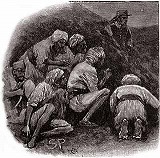“We were shut up in Bhurtee, the regiment of us with half a battery of artillery, a company of Sikhs, and a lot of civilians and women-folk. There were ten thousand rebels round us, and they were as keen as a set of terriers round a rat-cage. About the second week of it our water gave out, and it was a question whether we could communicate with General Neill’s column, which was moving up-country. It was our only chance, for we could not hope to fight our way out with all the women and children, so I volunteered to go out and to warn General Neill of our danger. My offer was accepted, and I talked it over with Sergeant Barclay, who was supposed to know the ground better than any other man, and who drew up a route by which I might get through the rebel lines. At ten o’clock the same night I started off upon my journey. There were a thousand lives to save, but it was of only one that I was thinking when I dropped over the wall that night.

“My way ran down a dried-up watercourse, which we hoped would screen me from the enemy’s sentries; but as I crept round the corner of it I walked right into six of them, who were crouching down in the dark waiting for me. In an instant I was stunned with a blow and bound hand and foot. But the real blow was to my heart and not to my head, for as I came to and listened to as much as I could understand of their talk, I heard enough to tell me that my comrade, the very man who had arranged the way I was to take, had betrayed me by means of a native servant into the hands of the enemy.
“Well, there’s no need for me to dwell on that part of it. You know now what James Barclay was capable of. Bhurtee was relieved by Neill next day, but the rebels took me away with them in their retreat, and it was many a long year before ever I saw a white face again. I was tortured and tried to get away, and was captured and tortured again. You can see for yourselves the state in which I was left. Some of them that fled into Nepal took me with them, and then afterwards I was up past Darjeeling. The hill-folk up there murdered the rebels who had me, and I became their slave for a time until I escaped; but instead of going south I had to go north, until I found myself among the Afghans. There I wandered about for many a year, and at last came back to the Punjab, where I lived mostly among the natives and picked up a living by the conjuring tricks that I had learned. What use was it for me, a wretched cripple, to go back to England or to make myself known to my old comrades? Even my wish for revenge would not make me do that. I had rather that Nancy and my old pals should think of Harry Wood as having died with a straight back, than see him living and crawling with a stick like a chimpanzee. They never doubted that I was dead, and I meant that they never should. I heard that Barclay had married Nancy, and that he was rising rapidly in the regiment, but even that did not make me speak.
“But when one gets old one has a longing for home. For years I’ve been dreaming of the bright green fields and the hedges of England. At last I determined to see them before I died. I saved enough to bring me across, and then I came here where the soldiers are, for I know their ways and how to amuse them and so earn enough to keep me.”
“Your narrative is most interesting,” said Sherlock Holmes. “I have already heard of your meeting with Mrs. Barclay, and your mutual recognition. You then, as I understand, followed her home and saw through the window an altercation between her husband and her, in which she doubtless cast his conduct to you in his teeth. Your own feelings overcame you, and you ran across the lawn and broke in upon them.”